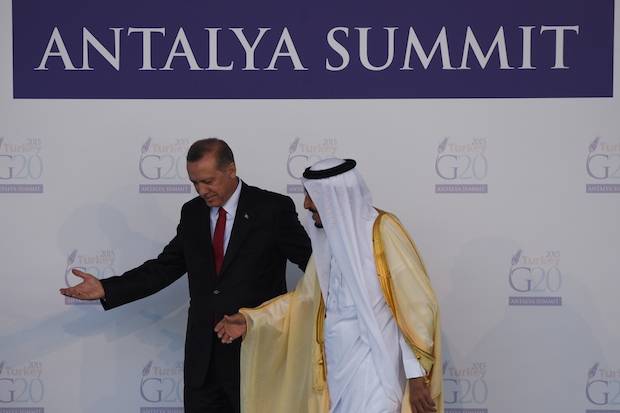It isn’t just Iran who have been angered by the execution of Shia cleric Nimr al-Nimr. Protests have erupted in Bahrain, Lebanon, Pakistan and Iraq, all places where the 1400-year-old Shia-Sunni divide remains a faultline. Iran’s reaction may seem uncompromising, with Ayatollah Khamenei tweeting: ‘The unjustly spilt blood of this martyr will have quick consequences’; but they have also sounded a note of caution. President Rouhani called for the arrest of the mob who stormed the Saudi embassy buildings. Perhaps he knows that, in the long run, Iran’s star is rising and the Saudis’ is falling.
In January of last year, Douglas Murray observed in The Spectator that ‘the region’s two most ambitious centres of power – the House of Saud and the Ayatollahs of Iran – find themselves fighting each other not just for influence but even perhaps for survival.’ In that fight, Iran has some major advantages.
The House of Saud’s hold on Arabia has faced growing tension as its population grows, and it becomes harder to shower them with cash. That process has been upended, inadvertently, by its closest ally, the United States. The explosion in the fracking industry has pulled the rug out from under Saudi Arabia’s oil profits and left its rulers boxed in. They cannot push up the price of oil without seeing the fracking industry displace Saudi.
The Saudi solution has been to hook itself up to its only available allies, the Muslim Brotherhood and Turkey’s president Recep Tayyip Erdogan. But these allies are themselves failing. Erdogan escaped election defeat by a whisker last year. Elsewhere, the Brotherhood suffered crushing blows in the Arab Spring, with Islamists being defeated in elections in Tunisia, civil war in Libya and a coup in Egypt. In its battle for survival, the House of Saud may have hitched itself to a fading star.
Iran, by contrast, is emerging from decades of isolation, after its nuclear deal with the US helped propel it back into the world. Unlike Saudi Arabia, Iran has its own parliament. The Ayatollahs may dig in their heels, or may opt, like Charles II, to cede power to parliament in return for survival. Either way, Iran – its economy boosted rather than dependent on oil – will be run by Iranians. Saudi Arabia cannot survive the fall of the House of Saud.
Some of our more sober Whitehall mandarins have recognized the new reality, likening the Gulf struggle to the opening of WW1. The House of Saud is cast in the role of Germany, contemplating an alliance with a crumbling Austria falling ever further behind the Triple Entente of Britain, France and Russia. In 1914 Germany opted for war now rather than later. And lost.
The region has noticed that Iran is in a strong position. On Sunday night the UAE followed Saudi’s lead in announcing the severing of diplomatic ties with Iran, but by Monday morning had qualified it as a temporary suspension in relations. Russia, too, is thinking strategically. Moral questions aside, Putin believes allying himself with Assad, with Hezbollah, and indirectly with Iran, has left him backing a winner. He may turn out to be right.
Richard Galustian is a defence and security contractor, based most recently in Libya.






Comments